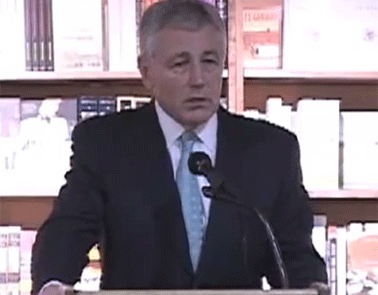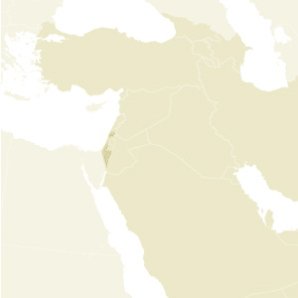
In a newly surfaced video recorded in 2008, during a promotion event for his then-recently published book [1], Secretary of Defense nominee Chuck Hagel expresses more concern over Israel’s nuclear weapons than Iran’s and advocates the U.S. engage with Iran and Syria:
In the video, an audience member asks “if Israel is attacked by Iran or an Iranian proxy like Hezbollah in a way that existentially threatens Israel, almost to the extent that Israel was attacked in ’73 and it was existentially threatened, would you support an American airstrike using U.S. forces, B2s, whatever on Iran?” Hagel responds with a three minute lecture. A full transcription is below, with relevant highlights (courtesy of the Weekly Standard).
“I’ll answer your question as honestly as I can. That’s a hypothetical question that somehow frames up the simplicity of the hypothetical question. The complications in the Middle East, and I’m certainly not an expert there, I have a chapter on the Middle East, I do know [laughter], I know a little something about the Middle East. I spent a lot of time there. And I spent a lot of time in Israel with the prime ministers and others. You who are well informed on this issue know the complexities starting with go back to the Bible, go back to ancient times, thousands of years. I mean that, if you really want to start trying to understand the Middle East, Paul, or David Aaron Miller, who you may know, has a new book out on this, The Not So Promised Land [The Much Too Promised Land]. And if you want to read something that is very, very enlightening, this guy he’s getting tremendous reviews on it. He’s Jewish. He worked in the State Department, worked for Baker, worked for Albright, I think he’s worked for four secretaries of state, different Democrats, Republicans. But it’s a great, great book.”
“But your question, I mean the complication of what’s going on there, Hamas is already attacking Israel. Iran supports Hamas. Iran supports Hezbollah. What I would much rather see is this administration, or hopefully the next administration, engage Iran, engage Syria. When I hear the talk about – well you can’t talk with Iran, you can’t talk with Syria and we’re, we should stay where we are and support Israel, and so on, well you miss the point.”
“Our policy has been so successful I believe, hasn’t it [laughter], that the Middle East is far better off today than it has ever been, isn’t it? [Laughter.] I mean all those countries, Lebanon is in great shape, Gaza is in great shape, Israel is in great shape, Iran, Iraq, things have never looked better, because we won’t talk to anybody. We are not going to have peace, stability, security or even any hints of it in the Middle East until Iran and Syria and all the players are part of it.
“Now that doesn’t apologize for or doesn’t close our eyes to what Iran has been doing, what Iran does do, but unless they are engaged in some way , then I don’t see this getting any better, and then where this could go, where this could eventually go. Someone was asking me the other day about a nuclear exchange in the world, where that would come from. I said well I’ll give you a scenario that’s very real. If Israel gets backed up enough into a corner and Israel uses a tactical theater nuclear weapon, you want to talk about seeing some things unravel in the world. The United States shouldn’t even be thinking about options of bombing Iran or anybody else. I mean we got our hands full right now. And we’re in such a hell of a mess.”
[1] Chuck Hagel and Peter Kaminsky, America: Our Next Chapter: Tough Questions, Straight Answers, March 25, 2008 (first edition), Ecco Press, 320 pages.
























Stay In Touch
Follow us on social networks
Subscribe to weekly newsletter